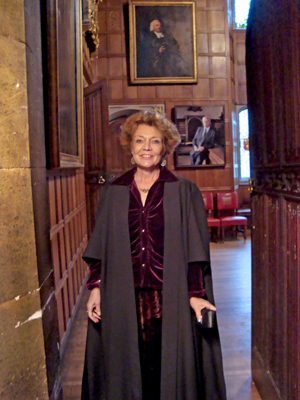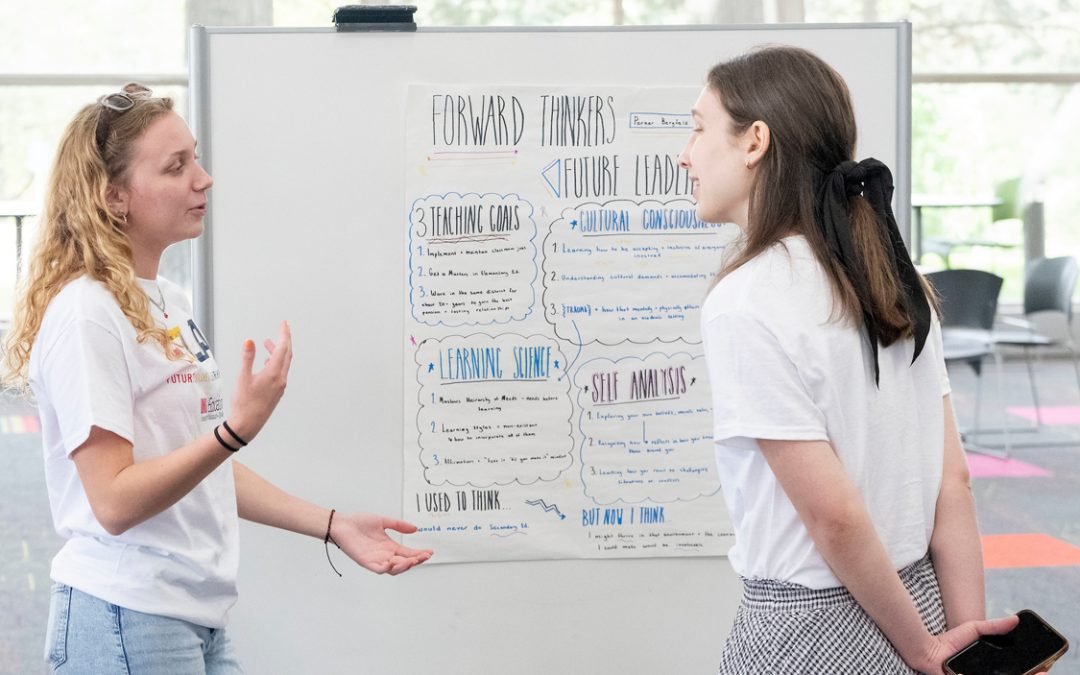Joyce Mushaben has a clear message for University of Missouri–St. Louis students.

Joyce Mushaben is a Curators’ Professor of Political Science at UMSL and the author of the forthcoming book “Becoming Madam Chancellor: Angela Merkel and the Berlin Republic.”
“Learn to speak a foreign language fluently, and the world will open its doors to you,” said Mushaben, Curators’ Professor of Political Science at UMSL.
She should know. The world has thrown open its doors to her as an internationally recognized expert on German politics, as well as comparative politics and gender studies. Mushaben is fluent in German, and her knowledge of Germany, its language and its culture have taken her abroad numerous times for visiting professorships, speaking engagements and to conduct research.
The latter has led to her forthcoming book, “Becoming Madam Chancellor: Angela Merkel and the Berlin Republic.” And her expertise most recently resulted in her delivering the keynote speech, titled “The Strange Tale of a Pastor’s Daughter in a Difficult Fatherland: Angela Merkel and the Reconciliation of East-West German Identities,” before an audience of 800 at the annual German Studies Association meeting in Washington, D.C. The event commemorated the 25th anniversary of German unification.
UMSL Daily caught up with Mushaben to discuss unification and the current refugee situation in Germany, as well as Merkel and the many challenges the German chancellor faces.
How did it feel to be asked to speak at the German Studies Association meeting on the occasion of commemorating the 25th anniversary of German unification?
I count among the founding members of the German Studies Association. We started with 100 members in the late 1970s, consisting largely of political scientists and historians; the association now has over 3,000 dues-payers, including German language, literature, film and cultural studies scholars who are spread across the United States, Canada, Germany, Switzerland and Austria. The GSA was in Kansas City for its fall 2014 conference, where the focus was on the 100th anniversary of the start of World War I. I had offered to deliver a luncheon speech on Angela Merkel for that event, but Executive Director David Barclay urged me to wait until we convened in Washington D.C. in 2015, which coincided with the 25th anniversary of unification. D.C. also tends to draw twice as many participants, especially from Europe. Naturally I felt honored by the invitation, but I was even more amused by the fact that I “outranked” the German Ambassador to the United States, who was then given lunch duty.
How were your remarks received?
Very well, considering that the crowd had already been sitting in windowless seminar rooms for eight hours listening to other scholars talk, followed by a heavy meal of over-priced, tasteless hotel banquet food with no direct access to the bar. As soon as they laughed at my first joke, I knew they would relate to the rest, although the west Germans probably felt more “provoked” by my reflections on their identities and their indifference toward easterners during the 1970s and 1980s than others in the audience.
How did you come to be interested in researching Germany, particularly its various identities pre-unification, as well as immigration and integration?
As high school salutatorian with a lot of Model United Nations experience, I applied to Georgetown University’s School of Foreign Service as an undergrad but was rejected because they had “no dormitories for women.” They did accept my buddy “Eric,” even though he was ranked 64th in our class. That was not only the beginning of my feminist consciousness but also the point at which I started learning German. Feeling pretty under-challenged by the Honors Program at Marquette University, I was recruited by my one and only female professor for a year-abroad program in Hamburg, Germany. With only a year of formal language instruction, I was immediately thrust into seminars punctuated by protests against the U.S. war in Vietnam – talk about challenging. I stayed for two years, redefined my political identity, came back fluent and have received very generous German government funding for my research ever since.
Focusing on the impact of generational differences and political cultural change on a nation divided since 1945, I first investigated western, then eastern and, eventually, “multicultural” German identities, while also considering the growing influence of the European Union in shaping citizenship, immigration, asylum and integration policies across its 28 member-states.
How has Germany evolved as a nation in the 25 years since unifying?
For social scientists concentrating on Germany, unification became a “defining moment.” I received a Ford Foundation grant to work on East German identity as of May 1989 at the American Institute for Contemporary German Studies (Johns Hopkins University). I was in the right place at the right time: When the wall fell on Nov. 9, it was easy for media people from across the USA and Canada to find me, as one of the few German Democratic Republic experts on this side of the Atlantic. West Germany was a wealthy, semi-sovereign yet powerful state that essentially swallowed its smaller, poorer eastern sibling whole in 1990. As GDR author Stefan Heym stressed, however, “the snake that swallows the porcupine is bound to experience digestion problems.” Westerners expected easterners to renounce all aspects of their former lives, to become just like them. Easterners expected to keep all of the economic security they had known (guaranteed jobs, subsidized daycare, free health care), while adding freedom to travel, democracy and higher standards of living. Neither side got what it prayed for. Germany united is a very different place now than it was in 1990 because of European Union influences, globalization forces and, of course, dramatic generational changes. It is still very rich, and significantly more powerful than before, but it has also become a friendlier country, which strongly supports human rights, environmental sustainability and multilateral cooperation.
Why focus on Merkel for your new book, particularly now, and what separates your book from other writings on the German chancellor?
I interviewed Angela Merkel before unification in June 1990, when both of us were “nobodies from a no-place,” and have followed her rapid rise to power through several stages. Elected in 2005, Angela Merkel is the first easterner, the first woman, the first physicist and first pastor’s daughter to serve as a German chancellor. She is also the first to have headed two grand coalitions, and has received more prizes for reconciling German-Jewish relations than any other national leader. Forbes has named her the World’s Most Powerful Woman nine times thus far. These factors alone render her worthy of academic study, but every book about her to date – I have read them all! – has been written by a journalist or a party-hack out to attack her or “communism.”
My book, “Becoming Madam Chancellor (under review at Cambridge University Press), started as an attempt to figure out “what difference difference makes,” in relation to her socialization as a female and as an easterner. I concentrate on her leadership performance and real policy outcomes in five domains since 2005, but the book can also be read as a story of how much Germany has changed since unification.
Are there challenges she’s been faced with that perhaps her male counterparts would not experience?
Angela Merkel has been challenged at every stage, mostly by hardliners in her own party, i.e., the Christian Democratic Union and its even more conservative Bavarian counterpart, the Christian Social Union. She has forced them to “cross that bridge to the 21st century” in relation to modernized family policies, gay rights, expanded daycare and paternal leave, female quotas for corporate boards, the end of nuclear energy and acceptance of immigration and integration. She has largely accomplished this by effectively leveraging EU policies and drawing support from parties that should be opposing her, like the Greens.
You’ve written extensively before on refugee issues and asylum policies in Germany. Can you discuss why that remains a relevant topic today? And how does Angela Merkel factor into that?
Merkel jokes that she is also a person of “migration background.” Her parents moved from Hamburg (west) to Templin (east) when she was an infant, then she moved from east to west after unification. As a scientist who prefers data-driven policies, she is acutely aware of her country’s looming demographic crisis: amidst mass baby-boom retirements, the German population is expected to plunge from 81 million to 69 million by 2035. It needs young migrants to counter serious skilled labor shortages, leading her to promote an unprecedented array of “welcoming culture” reforms. Since 2005, she has reversed draconian anti-foreigner policies and asylum restrictions imposed by Helmut Kohl in the 1980s. Her human rights stance is genuine, based on her recollection of oppressive East European regimes prior to 1989. She is willing to risk her own popularity and the ire of her party to meliorate the current refugee crisis; she can push France and the UK but finds it very hard to make East European countries take on their fair share of the EU refugee burden.
From your experience, how do the German people you’ve encountered feel about the situation?
The positive outpouring among average citizens is absolutely heartwarming, showing that reforms since 2005 have triggered a sea change in public opinion. People of all ages have been offering food, clothing, rooms in their houses and even language tutoring, not only in big cities, but in small towns that are usually suspicious of foreigners. The media tend to zoom in on anti-refugee demonstrations and arson attacks on hostels, but this is definitely not the “new normal.” Citizens are concerned about what it will cost them, but they are enjoying an export- and job-boom producing a tax surplus. The immediate problem is to channel more resources to local authorities. Germans are proud to have Merkel presenting the nation as a generous, “can-do” place with a strong human rights record – given the historical trauma that used to hang over their heads regarding forced migrations.














